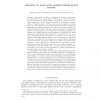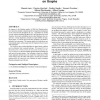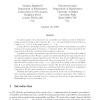335 search results - page 40 / 67 » Resolvent of large random graphs |
CORR
2008
Springer
13 years 7 months ago
2008
Springer
Abstract. We propose a number of techniques for learning a global ranking from data that may be incomplete and imbalanced -- characteristics that are almost universal to modern dat...
MP
2011
13 years 2 months ago
2011
We propose a number of techniques for obtaining a global ranking from data that may be incomplete and imbalanced — characteristics that are almost universal to modern datasets co...
CORR
2011
Springer
13 years 2 months ago
2011
Springer
Abstract—Breadth First Search (BFS) is a widely used approach for sampling large unknown Internet topologies. Its main advantage over random walks and other exploration technique...
ATAL
2011
Springer
12 years 7 months ago
2011
Springer
In response to the Mumbai attacks of 2008, the Mumbai police have started to schedule a limited number of inspection checkpoints on the road network throughout the city. Algorithm...
RSA
2010
13 years 6 months ago
2010
A random graph order, also known as a transitive percolation process, is defined by taking a random graph on the vertex set {0, . . . , n − 1}, and putting i below j if there i...



